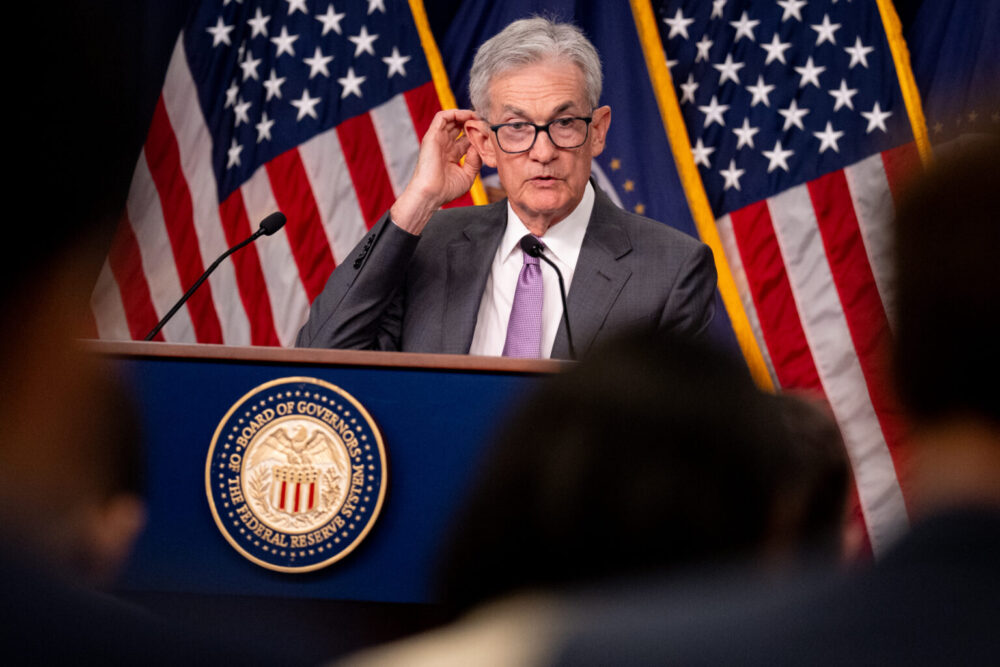The US Fed called an emergency meeting today following the collapse of Japanese markets, causing a global panic selloff. Experts estimate a 50-bps rate cut after the meeting.

The US Federal Reserve (Fed) reportedly summoned an emergency meeting unprecedentedly today.
With the global markets experiencing severe downturns, this meeting aims to reevaluate interest rates.
Moreover, analysts expect a Fed rate cut by 50 basis points (bps) after the meeting.
US Fed Emergency Meeting Amid Global Market Crash
The Japanese yen (JPY) has experienced a 13% decline, while the Korean and Taiwanese markets have declined by nearly 10%.
Additionally, Bitcoin price has seen a significant 18% drop in the past five days.
Meanwhile, the S&P futures have experienced a 4% decline.
According to reports, market uncertainty has prompted the U.S. Federal Reserve to convene an emergency meeting.
The situation has raised significant concerns, as the Federal Reserve is expected to reduce interest rates by 0.5% after the emergency meeting.
According to CNBC host Ran Neuner, this is a critical moment: “This is the moment we have been waiting for.” He added, “The FED will need to react really fast to avoid a meltdown that could make 2008 look like a joke. It’s an election year. I’m expecting emergency action.”
The reversal of the Japanese cash and carry trade, which has resulted in pervasive panic across the global markets, appears to be the catalyst for this financial turmoil.
The probability of a rate cut in September has now reached 100%, reflecting the situation’s urgency.
Market analysts imply that an interest rate cut could offer some relief.
Historically, Fed rate cuts have stabilized markets, most notably during the 2007–2008 financial crisis.
“Interest rate cuts saved the housing market in 2007,” noted one analyst.
The Federal Reserve’s prompt response is essential to prevent additional economic instability.
The emergency meeting emphasizes the need for immediate action and the severity of the current market conditions.
However, Bitcoin critic and prominent economist Peter Schiff predicts a recession if the US Fed cuts interest rates.
Impact On Bitcoin & Crypto As Recession Risk Soars
According to a report by its economists, led by Jan Hatzius, the probability of a U.S. recession in the coming year has been increased from 15% to 25% by Goldman Sachs Group Inc.
The report underscores that there are several reasons not to be concerned about an economic downturn, despite the heightened risk, even in the wake of a substantial increase in unemployment.
Clients received the report on Sunday, emphasizing that the economy remains “fine.”
Economists pointed out that there are no severe financial imbalances, and the US Fed has plenty of room to cut interest rates if necessary.
Goldman Sachs’ projections for Federal Reserve activities are more conservative than those of JPMorgan Chase & Co. and Citigroup.
Hatzius’s team anticipates that the central bank will reduce its benchmark interest rate by 25 basis points in September, November, and December.
“The premise of our forecast is that job growth will recover in August and the FOMC will judge 25bp cuts a sufficient response to any downside risks,” the Goldman Sachs economists stated. They also noted, “If we are wrong and the August employment report is as weak as the July report, then a 50bp cut would be likely in September.”
In addition to BTC and other digital assets, the crypto market is also affected by these economic forecasts and prospective rate cuts.
Historically, interest rate cuts in the United States have been positive for risk-on assets, including cryptocurrency.
Traditional investments become less appealing as interest rates decrease, prompting investors to pursue alternative assets such as Bitcoin that offer higher returns.
Furthermore, Bitcoin is commonly regarded as a hedge against inflation and economic instability.
If the Federal Reserve implements aggressive rate cuts, it could potentially drive more investors toward BTC as a store of value by signaling concerns about economic health.
However, market observers remain wary in light of Schiff’s and other experts’ warnings.
